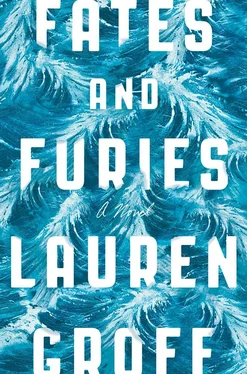“Not I,” said Lancelot.
“Nor I,” said Leo. He regarded Lancelot for a caesura and finally relaxed into an off-kilter smile.
—
HE HAD HANDS that could palm a basketball, Leo Sen, though his frame was a slight and stooping six feet. This was their first intoxicating talk on the couch, everyone else faded back to Ping-Pong or pool or home over the dark ground to work some more, dim headlamps to light their paths.
The opera this past summer came out of his struggles with a foundering kind of sadness, the feeling of panic as the outside world came roaring in. “I work my way out of it usually,” Leo said. “I fight my music until we’re both too exhausted to feel much of anything.”
“I know exactly what you mean. It’s like Jacob wrestling with God,” Lancelot said. “Or Jesus with the devil.”
“I’m an atheist. But they sound like nice myths,” Leo said, and laughed.
He said his house on the Nova Scotia commune island was made of hay bales and mud, and that his job there was to teach music to anyone who wanted to learn. He owned few things: ten white button-down shirts, three pairs of jeans, socks, underwear, pair of boots, pair of moccasins, a jacket, musical instruments, and that was about it. Stuff had never interested him, beyond the music he could make from it. Books were necessary but borrowed. His only extravagance was soccer, though he called it football, of course, rooted for Tottenham. His mother, you see, was Jewish; she loved how Tottenham fought back against anti-Semitic slurs and called themselves the Yid Army. The Yiddos. For Leo, he said, it had also been the name, so meaty, so metrical. Tottenham Hotspur, its own tiny song. In the common house on the island there was a television, satellite dish like a cocked ear on the roof, mostly for emergencies, but they made an exception for Leo Sen’s passionate love of the game.
“I hated my violin as a boy,” he said, “until my father made me compose a score as a match was happening on the telly. Tottenham, Manchester, our boys losing. And suddenly, as I was playing, everything that I had felt so deeply without music deepened even more. The dread, the joy. And that was it for me, re-creating that moment was all I wanted to do. I called the composition Audere Est Facere. ” He laughed.
“To dare is to do?” Lotto said.
“Tottenham’s motto. Not a bad way to be an artist, in fact.”
“Your life seems simple,” Lancelot said.
Leo Sen said, “My life is beautiful.”
Lancelot saw that it was. He was enough of a lover of forms to understand the allure of such a strict life, how much internal wildness it could release. Leo waking to dawn over the cold seabird ocean, the fresh berries and goat-milk yogurt for breakfast, the tisanes of his own herbs, blue crabs in the black tide pools, going to bed with the whipping winds and rhythm of waves against hard rock. Lettuce shoots glowing in the south-facing windows. The celibacy, the temperate, moderate life that Leo lived, at least on the outside, in his state of constant cold. And the feverish musical life within.
“I knew you’d be an ascetic,” Lancelot said. “I just thought you’d be a wild-bearded one who speared fish and wore a loincloth. In a saffron-colored turban.” He smiled.
“On the other hand, you,” Leo said, “were always dissolute. It’s clear in your work. Privilege is what lets you take risks. Life of oysters and champagne and houses on the beach. Coddled. Like the precious egg you are.”
Lancelot felt stung, but said, “True. If I had my druthers, I’d be three hundred fifty pounds of jollity and fun. But my wife keeps me to heel. Makes me exercise every day. Keeps me from drinking in the morning.”
“Ah,” said Leo, gazing at his own enormous hands. “So, there’s a wife.”
The way he said it. Well. It made the ideas Lancelot had about Leo reshuffle themselves once more in his head.
“There’s a wife,” Lancelot said. “Mathilde. She’s a saint. One of the purest people I’ve ever met. Just morally upright, never lies, can’t bear a fool. I’d never met someone who stayed a virgin until just before she got married, but Mathilde was. She thinks it’s unfair that other people clean up your dirt, so she cleans our house even though we can afford a housekeeper. She does it all. Everything. And everything I write I write for her first.”
“The grand love story, then,” Leo said lightly. “But it’s exhausting to live with a saint.”
Lancelot thought of his tall wife with her blaze of white-blond hair. “It is,” he said.
And then Leo said, “Oof, look at the time. I need to go to work. Nocturnal beastie, I’m afraid. Shall I see you in the afternoon?” and Lancelot saw they were alone, most lights turned out, and it was three hours past any bedtime he usually had. Also, he was drunk. He couldn’t locate the words that would tell Leo how profoundly familiar he had found him. He wanted to say how he, too, had had a good dad who understood him, and he, too, longed for a simple, clean life, and how he, too, found his fullest joy in the midst of work. But Leo’s studio was across the field and through the forest, and when they came out of the main house, the boy said good-bye quickly, invisible, though his breath plumed white into the darkness. Lancelot on his own slow shuffle through the pitch-black had to be satisfied with the thought of tomorrow. The revelations falling off in layers, like the separate skins of an onion. He would find a true friend all the way on the inside.
He fell asleep watching the lick of flames in his fireplace, a long, slow submergence and smoky contentment that led into a sleep the depth of which he could not remember having had for years.
—
HOT MILK OF A WORLD, with its skin of morning fog in the window. Lunch on the porch, in a plaited basket, vegetable soup and focaccia and good cheddar and celery and carrot sticks and an apple and cookie. Glorious blue-gray day, and he couldn’t stay inside. He wanted to be working. In late afternoon, he pulled on his boots and his Barbour jacket and went out for a walk in the woods. The chill on his face turned itself inside out and he grew warm. Heat begat lustiness and lustiness carried him to a moss-covered rock, a deep cold beneath the warm green velvety nap. With his pants to his knees, engaged in heavy self-fondle. Thoughts of Mathilde had become amagnetic, rebounding off her, spinning outward, ending up hopelessly tangled in thoughts of an Asian nymphet cooing at him in a schoolgirl’s kilt, as fantasies tended to. Tree branches gray slats above and moving polka dots of crows. Frantic motions in the groinal area until the inevitable upward spin and the slick in the palm.
The lake at his heels so still. Poxed by the touch of scattered rain.
By the time he stood, anxiety was thickening in his chest: he hated putting off work when he was in the mood. It was as if the muses were singing [rather, humming] and he’d stuffed up his ears. He walked in the general direction of Leo’s cabin, the silence of the woods so eerie the ancient poems of his babyhood returned to him. He sang them to himself as if they were songs. When he arrived at Leo’s — pinkish stucco, pseudo Tudor, flanked with ferns that gleamed in the dim gray light — he understood that he’d been hoping he’d find his collaborator noodling around on his porch. But there was no movement anywhere, and inside, the curtains were unstirred. Lancelot sat behind a birch tree, wondering what to do. When it grew dark enough, he crept near and looked in the window. No lights had been turned on, but the curtains had been opened and someone was moving in the room.
It was Leo, and he was standing, his skinny white chest bare, and he had his eyes closed, his freckled face young, almost teenaged-looking, and his hair in little sandy tufts all over his head. He was waggling his arms. Once in a while, he would move over to the sheets set on the piano and make notations and hurry back to where he had been, closing his eyes again. His bare feet were as enormous as his hands and, like the hands, red at the knuckles with cold.
Читать дальше












